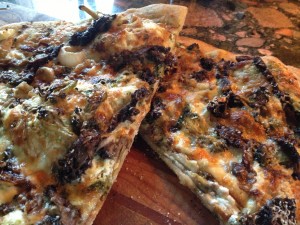I thoroughly enjoy mushrooms—in fact, I actually crave them. It’s likely that this craving can be traced to my Italian culinary heritage—we often add mushrooms to pizza and pasta dishes, but we find them equally delicious in soups, stir-fries, and salads. In addition to the common white button mushroom, we also search for maitake, morel, oyster, portobello, shiitake, and any other unique varieties that appear at our local farmer’s market or natural foods store.
Both wild and cultivated mushrooms have been prized for their nutritional and medicinal benefits for thousands of years. In fact, in ancient China, certain medicinal mushrooms were so rare that they were reserved for royalty only. Today, medicinal mushroom extracts are one of the most researched natural medicines in the world. These concentrated extracts have demonstrated profound health promoting and disease inhibiting effects, and show promise for preventing and treating cancer, Alzheimer’s disease, cardiovascular disease, and diabetes. I’ve been so impressed with the research findings on mushrooms that I’ve added mushroom extracts to several of my nutritional formulations.
Some medicinal mushrooms, such as reishi and turkey tail, aren’t used in cooking because of their texture or undesirable flavor. But plenty of culinary mushrooms are not only delicious; they also have significant health benefits. In the past couple of decades, the availability of mushrooms has grown—even regular supermarkets often carry shiitake and portobello mushrooms alongside button mushrooms. Shiitake caps are a tender, flavorful staple in Asian cuisine (the stems are tough, but excellent for making stock), and portobello mushroom caps are tasty grilled whole or stuffed and baked. I frequently prepare mushrooms by sautéing one or more varieties with garlic, olive oil, butter, a generous amount of white wine or sherry, a pinch of sage, black pepper, and salt. This simple dish is delicious as is, as a topping for pasta or pizza, or when chilled, added to a green salad.
Nutritionally, mushrooms are very low in calories and fat but high in carbohydrates, fiber, and protein—when combined with whole grains, they form a complete protein.
Mushrooms are an excellent food for weight loss because although they contain few calories, they are satisfying and filling, especially portobellos, which have a meat-like quality and make an excellent main course. To add to their nutritional profile, mushrooms contain a variety of minerals and trace elements such as potassium and copper and vitamins such as riboflavin, niacin, and folate. In general, I recommend cooking mushrooms—cooking them removes water, breaks down some of the indigestible fiber, and concentrates nutrients and flavor.
As an herbalist, I find it fascinating that mushrooms contain an array of powerful phytonutrients, including unique immune-enhancing polysaccharides. Apart from being recognized as a nutritious food, certain mushrooms are also an important source of biologically active compounds with medicinal value, including phenolic compounds, sterols and triterpenes. In vitro and in vivo studies with mushrooms and isolated bioactive constituents suggest many beneficial pharmacological effects including anti-tumor, antioxidant, antiviral, cholesterol lowering, and blood sugar lowering effects.

I am convinced that eating mushrooms often (daily, or at least several times a week) provides profound health benefits, including lowering the risk of cancer. Recently, several research papers have documented a correlation between dietary mushroom intake and a significant reduction in breast cancer (Shin, et al., 2010; Hong, et al., 2008). In one study, the benefits were enhanced when green tea was consumed daily as well (Zhang, et al., 2009).
One particularly interesting paper on mushrooms and breast cancer found that mushrooms down-regulate the aromatase enzyme, which is responsible for the conversion of androgen hormones into estrogen. Most estrogen after menopause comes from the action of aromatase. Certain estrogens promote the growth of most breast cancers (and other reproductive cancers), hence overactive aromatase is a primary contributor to hormone-related post-menopausal breast cancer and other estrogen-related cancers. Aromatase inhibitors are therefore used for treating estrogen-dependent tumors following menopause. The aromatase inhibitors approved by the US Food and Drug Administration include anastrazole (Arimidex), exemestane (Aromasin), and letrozole (Femara). These drugs cause numerous unwanted side effects and are not recommended for prevention. However, several natural compounds in plant medicines and foods, including mushrooms, have gentle hormone balancing effects. For example, research shows that white button mushrooms appear to modulate and reduce aromatase activity and inhibit the proliferation of breast cancer cells (Grube, et al., 2001).
NUTRITIONAL VALUES OF BUTTON MUSHROOMS
Fresh, Cooked
Serving Size: 1/2 cup pieces
- Calories: 21
- Fat: 0 g
- Saturated Fat: 0 g
- Cholesterol: 0 mg
- Carbohydrate: 4 g
- Protein: 2 g
- Dietary Fiber: 2 g
- Sodium: 2 mg
- Riboflavin: <1 mg
- Niacin: 4 mg
- Iron: 1 mg
- Potassium: 277 mg
- Zinc: 1 mg
- Selenium: 9 mcg


I thought that mushrooms were also high in Iodine. I know that when I was taking large doses of medicinal Reishi mushrooms my Iodine intake dropped to zip (muscle testing) I did not realize that it was the mushrooms until I listened to a mycologist’s lecture and in passing he mentioned that M.R. contained Iodine.
Hi Jessieann – Mushrooms contain trace amounts of iodine. They are not considered an iodine-rich food compared to sea veggies, sea food, eggs, cranberries, yogurt, and apricots.
Would love to get the recipe for Donnie and Jen’s Morel Mushroom Pizza. It’s looks great.
Look for a blog post with the recipe in the near future!
Great article! I often crave mushrooms. I love Tom yum and Tom Kha soup and eat lots of white button mushrooms raw.
Seven weeks ago I became a vegetarian.
For the past couple of weeks I crave mushrooms! I assume that it’s something lacking in my diet??